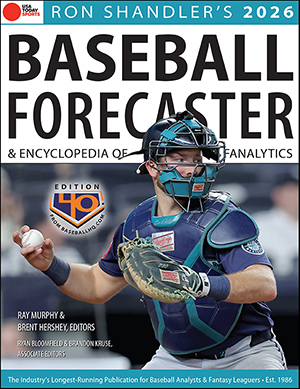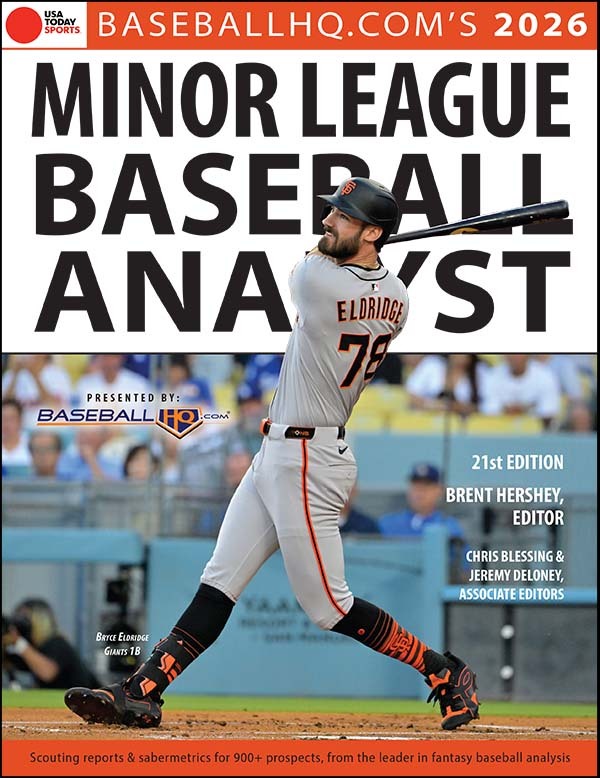
(*) MASTER NOTES: Player Value
I made a trade in my Tout Wars Mixed League last week. Not long after, I got an e-mail to the BaseballHQ Radio podcast e-mail address, bhqradio@gmail.
That these two things occurred at roughly the same time could be described as coincidence, or serendipity. Or it might be described as “ironic,” by someone who doesn’t know what irony is, such as every baseball color announcer anywhere.
Once I confirmed that “Will in Connecticut” wasn’t a bot trying to get me to divulge my online-banking password, I read with interest his detailed and fairly complex question about in-season player valuation. The topic was actually on my mind, which has plenty of available space now that Game of Thrones is over. I had been making lots of offers in two different leagues, which meant player value was really important. Here’s what I wrote in my reply e-mail:
Dear Will: I have come to believe many fantasy owners who play category-based formats like Rotisserie misunderstand or misapply the nature of "value" during the season.
A lot of owners calculate the “fairness” of trade offers by looking up the dollar value in stats packages like our own carefully calculated BaseballHQ.com player stat files. They need the combined dollar values of the players to add up to relatively equal sums—I’m giving $42 in “value,” I need to get at least $42 in “value” back.
Here’s the trouble: Like that Jon Nunnally rookie card you bought on eBay, a player has no actual dollar value once the auction is over and they start playing real games…
The valuation you see in the player spreadsheets at BaseballHQ is general because it has to apply to thousands of subscribers in thousands of leagues. But because it has to apply to all leagues in general, it doesn’t apply to any league in particular. The valuation process must include assumptions about league size, categories used, and so on.
But no system can know the details of the gaps between you and your opponents within the categories in your particular league at this particular moment. The system has to assume the gaps are uniform—x amount of HRs will gain one point, and 4x HRs will gain 4 points.
As we know, however, the gaps aren’t uniform. Some categories “bunch” like sleepy puppies and others spread out like visiting in-laws. As well, your team’s position in the category varies. In this environment, comparing players by dollar amount is pointless.
The player’s only value to you is how much he can move your team in the standings. There might be a little extra value in being able to brag that you drafted, say, Paul Goldschmidt, although you have to factor in the potential cost of boring your dinner date.
This is the critical point that a lot of owners miss when they assess trades and roster moves.
By way of example, I refer to my process in the Tout Wars Mixed Auxction league.
I had projected the league, and I figured my team to win the HR category by 40 swats, and to finish second in RBI, 40 ribs behind the leader and 40 ahead of the third-place team. I was at the low end of a clump of teams in SBs, and at the low end of a clump in strikeouts.
To address the SB possibility, I wanted to activate Austin Jackson from my reserve, which created an opportunity to deal an OF. The candidates came down to Jarrod Dyson of the Royals, a prototype one-category player who gets SB and nothing else. (I wish he were an infielder because then I could say how Dyson really vacuums up grounders.) The other candidate was Nelson Cruz, the opposite of Dyson, capable in contributing in every category but steals. If he could steal bases, he’d be a full Nelson. Take that, Chris Berman.
At auction, I got Cruz for $15 and his projected value for the rest of the year, using the BHQ Custom Draft Guide as calibrated for the Tout league, Cruz projected to be worth about $20. I had snabbed Dyson in the reserve round at auction, and he his projected value was about $13.
Clearly, Cruz was the “value” choice.
But as I said before, different assets have different value because of the context. Let’s take an example from the War of the Roses, which had nothing to do with Pete Rose, although he certainly had the haircut for it.
Anyway, during one battle, King Richard III was apparently willing to trade the kingdom of England for a horse, plus a squire to be named later.
The reason? Context. Things were not going well for Richard’s squad, and he had a hunch (hee hee) that a horse would help him maintain his position in the “Guys Who Are Alive” category, which greatly outweighed the immediate (and more abstract) value of being in first place by a mile in the “Being King of England” category.
Shakespeare didn’t write about baseball (although he did write The Comedy of Errors, despite never having seen the 1962 Mets or the 2013 Astros), and I wasn’t trying to value the English crown against, well, livestock. But I did find myself making a similar calculation of value in the context of my situation.
In context, the dollar values from auction and the CDG projection were, well, valueless. Cruz’ power stats couldn’t move me at all in HR/RBI, while Dyson’s projected 20 SB could be worth as many as seven points in the tight SB category. (Each player also had Runs and OBP effects, but they were minor in my situation.)
So, even though Dyson was “worth” $7 to $15 less than Cruz in abstract valuation, he was worth hugely more in his potential effect on my standings. In fact, even Jackson might have been more valuable than Cruz as well. In context, I needed Cruz like Kanye West needs assertiveness training.
Cruz did have some value to me as a trade chip. Quite a few teams in my league could use his HRs and RBI to make good gains in those categories, with some of those gains at the expense of my main overall competitors.
So I offered Cruz to a few teams who had SB surpluses, but didn’t get any results. This was partly due to the tightness of the SB category—like me, they all saw the bountiful harvest of points available there. One owner, though, had more potential for a deal, because his situation was the opposite of mine: He couldn’t get points with SBs, but could with power.
Unfortunately, he wouldn’t trade his speedster for Cruz straight up. He had paid $30 at auction for his guy, who was projected to be worth in the high $20s for the balance of the year. And since he “valued” Cruz at $20, he insisted I had to give him another $7 worth of “value,” in the form of an extra player I couldn’t spare—it would have cost me points elsewhere. A deal that should have been made wasn’t made.
Fortunately, the strikeouts category was also tightly bunched, and I saw a chance to get points there. I found an owner who needed some pop and had strikeouts to spare, and swapped Cruz one-for-one for James Shields after an exchange of one e-mail.
Using the standard thinking, I should have demanded more. Shields is “worth” $4-$6 less than Cruz in the CDG, but my projections say Shields’ added strikeouts could move me seven or eight points in the category. And the owner who acquired Cruz could ride those HR and RBI past the two guys I am chasing in the overall standings.
That’s worth $6, isn’t it?





-300x200.png)



